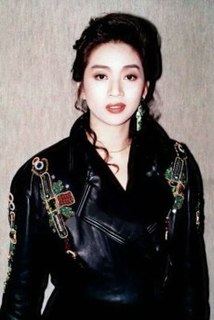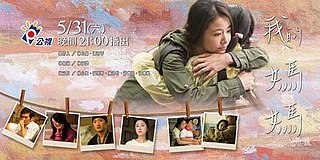
Anita Mui Yim-fong was a Hong Kong singer and actress who made major contributions to the Cantopop music scene and received numerous awards and honours. She remained an idol throughout her career, and is regarded as a Cantopop diva. She was dubbed as the "daughter of Hong Kong" and is considered one of the most iconic Cantopop singers.

Hibari Misora was a Japanese singer, actress and cultural icon. She received a Medal of Honor for her contributions to music and for improving the welfare of the public, and was the first woman to receive the People's Honour Award, which was conferred posthumously for giving the public hope and encouragement after World War II.

Yuki Hsu is a Taiwanese singer and actress from Taiwan. She is perhaps best known for her series of hits in Taiwan between 1998 and 2001. Most of her songs in her early career are upbeat, catchy, melodic dance tracks, often with youthful themes or lyrics. Some of her well-known songs include "Ding Dong", "Who's Naughty", and a remake of the '90s techno track "Dub-i-Dub". In 1999 she collaborated with South Korean rapper Yoo Seung Jun on the duet "Can't Wait". She is also noted for the flamboyant and outlandish hairdos she sported in many of her early music videos.

Lim Giong is a Taiwanese musician, DJ, actor, and an active figure in the Taiwanese experimental electronic music scene. He is known for Taiwanese Hokkien rock songs from early in his career, as well as film scores for directors such as Hou Hsiao-hsien, Jia Zhangke, and Bi Gan. His has received numerous awards for his work, including the Cannes Soundtrack Award in 2015.

Profanity in Mandarin Chinese most commonly involves sexual references and scorn of the object's ancestors, especially their mother. Other Mandarin insults accuse people of not being human. Compared to English, scatological and blasphemous references are less often used. In this article, unless otherwise noted, the traditional character will follow its simplified form if it is different.

Liu Tao is a Chinese actress from Nanchang, Jiangxi. She is known for her roles in Demi-Gods and Semi-Devils (2003), Madame White Snake (2006), Mazu (2012), To Elderly With Love (2013), Nirvana in Fire (2015), Legend of Mi Yue (2015), Ode to Joy (2016) and The Advisors Alliance (2017).
Tan Kheng Seong, better known by his stage name Ah Niu or Ah Gu, is a Malaysian Chinese singer in Malaysia and Singapore.
Zero Chou is a Taiwanese director and screenwriter.

Timi Zhuo or Zhuo Yi-ting is a singer and actress from Taiwan. She has recorded over 800 songs in Mandarin and Taiwanese Hokkien, and 2 songs in Cantonese.

Gong Qiuxia, also romanized as Kung Chiu-hsia was a Chinese actress and singer. By the 1940s, she became one of the seven great singing stars.

Rene Liu Ruo-ying is a Taiwanese singer-songwriter, actress, director and writer. In the Sinophone world, Liu is widely known by her affectionate nickname "Milk Tea". Her music often focuses on love stories and has built an image around herself as a single woman. She is known for her mature, professional, urbane, single woman persona.
Kong Lin is a Chinese actress, television series and movie producer, art director, and semi-rock-pop singer. Born in Hangzhou, Zhejiang she now lives in Beijing, Jilin.

Lin Wanfang, professionally known as Wanfang, is a Taiwanese singer, actress and radio DJ. She is renowned for her sonorous, gentle soft voice and probably best known for being the original theme singer of the film C'est la vie, mon chéri (新不了情).

Mother Mother is a 2014 Taiwanese television film. Starring Ruby Lin alongside Kao Ying Hsuan, it is the 2nd television film produced by Lin. It first aired on the Public Television Service (PTS) on 31 May 2014.

Wu Lei, also known as Leo Wu, is a Chinese actor. He is known as the "China's Little Brother" in China.
The Nine Songs Contemporary Children's Literature Award (九歌現代少兒文學獎), or Nine Songs Children's Literature Award (九歌儿童文学奖), is an award for children’s literature created in Taiwan. Eligible works should be between 40,000-45,000 words, and suitable to children aged 10–15 years. Also known as the ChiuKo Award.
Chang Yi was a Taiwanese film director.

The Dajia Mazu Pilgrimage is an annual celebration of the Taoist sea goddess Mazu held in Taiwan. During the festival, a statue of Mazu is placed in a litter and carried by foot on a round-trip journey from Jenn Lann Temple in Dajia, Taichung to Fengtian Temple in Xingang, Chiayi, stopping at many more temples along the way. The festival lasts for nine days and attracts large crowds of pilgrims, who travel alongside the litter.












